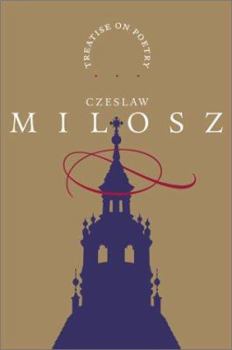A Treatise on Poetry
The Nobel Prize-winning poet Czeslaw Milosz began his remarkable A Treatise on Poetry in the winter of 1955 and finished it in the spring of 1956. It was published originally in parts in the Polish... This description may be from another edition of this product.
Format:Hardcover
Language:English
ISBN:0060185244
ISBN13:9780060185244
Release Date:April 2001
Publisher:Ecco Press
Length:144 Pages
Weight:0.72 lbs.
Dimensions:0.7" x 5.5" x 8.3"
Customer Reviews
2 ratings
A great poet's most important work
Published by Thriftbooks.com User , 19 years ago
This long and complex poem poses the explicit against the inexplicit, the aesthetic against the historical, nature against culture and history, history against freedom and human aspiration. The preface prescribes a simple enough formula for poetry: plain language "in the mother tongue," images, rhythm, dreaminess. But it notes that poetry written to this formula "was bypassed by the dry sharp world." That world is Poland of the first half of the twentieth century. The problem posed by this treatise is how poetry can account for reality, specifically the reality of history, and still function aesthetically. The problem occurs not because an allegiance to history is an adequate response to human difficulties-individual memory, freedom, and universal aesthetic ideals are superior to it-but because history represents a necessity that must be adequately acknowledged. The simple answer is that poetry must include the actual world, and not settle for merely recording emotions, as some of the poets of Milosz's youth did. But this is more easily said than done. Talented poets, many of them named in the Treatise, have failed to find adequate ways of accounting for historical reality. Negotiating between aesthetic idealism and coruscating rationalism, uniting "Freedom and Necessity," is the task Milosz sets for himself. The poem is divided into four parts, plus the brief preface. "Beautiful Times," the first section, depicts Krakow, the seat of polish culture, around 1900. The second section, "The Capital," set in Warsaw, assesses poet by poet the state of Polish poetry before the Second World War, and criticizes its inability to account for the massive rush of history that was about to occur. The third and most powerful section, "The Spirit of History," depicts through scenes of the Occupation in Poland the terrible consequence of Nazi and Polish idealism. Both represent the failure of history, culture, and language to form coherent and realistic world-views: Nazi idealism undermined by inhuman brutality, Polish idealism betrayed by incoherent and outdated romanticism. The last section, set in Pennsylvania, considers America as an escape from history and culture into nature, which Milosz finds "hostile to art," and examines the implications for a poet of being in such a place (he would soon return to Europe) after the great failure of poetry and culture embodied in the war.
A reading experience and textual event not to be missed.
Published by Thriftbooks.com User , 23 years ago
Every poet should read this seminal work. And if you're not a poet, you should read "A Treatise" to understand poetry, learn history and tune into your inner self. It is a reading experience and a textual event that should not be missed.Milosz has written one of the great poems of our century. It is a shame that it took half a century to get the full English translation out, which corrects a serious deficit in the cultural terms of trade between Poland and the English-speaking world. It is as if Shakespeare's Hamlet or Othello has only just been translated into Polish. If you're familiar with "The Wasteland" of TS Eliot, you will compare "A Treatise on Poetry" very favourably to to the 1922 modernist classic. Indeed, it is an improvement on Eliot's masterpiece in four crucial respects. First, "A Treatise" maintains an overall structure and form that the amorphous "Wasteland" lacks. The English translation may not have retained the metrical structure of the original, but conveys the sense of form Milosz carefully constructed to carry his theme. Second, although the poem manipulates myth and symbols to register the brutal truths of our century, it does not shy from recording historical events or capturing the drama of individual lives. Despite its wide historical canvas, stories of our innermost being are told and you will enter the skin of real lives long consigned to dust. Third, the poem addresses you at several levels. Its tone ranges from the bright, breezy and hopeful to the elegaic and tragic and downshifts to a deep and quiet understanding. The modulations in mood and voice are exceptionally rendered, making the reading of the poem an experience in itself. Fourth, "A Treatise on Poetry" lives up to its title without ever being ponderous, technical or trite. Reading the detailed notes to illuminate the symbolic shorthand of the verse enhances your reading experience. With an intimate understanding of Polish poetry, its pracititioners and their interaction with the driving forces of the first half-century, Milosz offers a compelling portrait of poetry's potential, its limitations, and its reach. You will come away despairing of humanity, but sanguine about the value and use of poetry. In conclusion, Milosz has written a great work of art that defies easy paraphrase, facile criticism or quick comparisions. It must simply be experienced. I am quite confident that it will be considered one of the greatest poems of our century in the years ahead.





